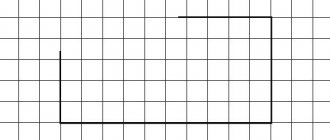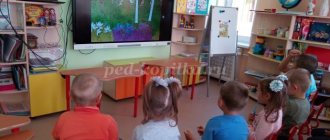Word games are a real salvation for parents. They can keep your child occupied in line, on the train, in the car, on the way to the metro... In short, when you need to pass the time, but there is nothing at hand. Or everything is there, but it has become boring.
Word games are very useful - they develop speech, memory, imagination, thinking, enrich vocabulary, and train phonemic hearing. And they're just fun to play! With the right word game, time flies.
This collection contains 14 games, arranged in increasing difficulty.
"I see something..."
The driver makes a wish for an object that is in the players’ field of vision: “I see something...” and names the color, shape, first letter of the word, etc. Players must guess the item.
The game is remarkable because it can be played with kids, making something very simple, and with older children. If you see that the child can cope easily, you can limit it to two or three attempts.
Example: “I see something green...” Players go through the options - a car, leaves on a tree, etc.
“I see something round...” (glasses on a person, road sign, traffic light, etc.)
4. "Words"
The first player says a word, the second player says a word starting with the last letter of the previous word.
Example: Shirt – Archaeologist – City – House, etc.
A more difficult option: come up with words starting with the last two letters of the previous word.
Example: TelnyashKA – KayuTA – Taxi – Syrup, etc.
Attention! In the complicated version, there may be words whose last two letters do not allow forming a word (for example, “foreigner”, “character”). If all players agree that a new word cannot be formed from the last two letters, then in this case the last letter is taken for word formation, as in the usual version of the game.
Games aimed at developing fantasy and imagination
Homemade walker
Of course, a game with cubes and chips can be purchased at any children's store, but a game made together with a parent will be of particular value.
You can print or take a poster with a picture of your favorite character from a magazine, stick on circles with numbers, draw arrows - and the game is ready.
It is important to discuss each manufacturing step with your child, or entrust him with writing numbers and drawing arrows.
Busomania
For this game you need beads of different lengths or regular ropes. From these, the baby will be able to lay out various shapes, letters, numbers, and pictures on the floor. You can think of a theme for “bead drawing”, for example, “mysterious animal”, “city plan” or “write your name”.
Artist
An adult draws a squiggle on paper, and the child tries to finish drawing it so that it turns out to be a certain object.
After completing the drawing, the adult tries to guess what happened. Sometimes a child’s imagination is so developed that incomprehensible squiggles turn into real masterpieces.
8. "Poker"
This fun word game is especially popular with kids. Ask the children to make a wish for any piece of furniture (chair, armchair, etc.) or kitchen utensil (fork, poker, rolling pin, etc.).
Then the driver asks the players various questions, which must be answered only with the hidden word.
Example: What is your name? - Poker.
What did you have for breakfast today? - Poker.
What gift did you receive for your birthday? - Poker.
Another version of the game: players think of words for each other, which they will then use to answer the driver.
Complication: You can't laugh.
Word games for children 6-7 years old
Entering school requires a first-grader to concentrate on educational activities. Of course, in the first year or two, teachers still try to include playful moments in the educational process, but still, studying is not toys, but a serious activity that requires willpower, composure and perseverance.
But still, the main activity of a child in the first years of life is play. Through play, kids get to know the world around them:
- learn letters and numbers;
- train memory and attention;
- develop logical and innovative thinking;
- study colors and shapes, seasons and days of the week;
- stimulate creative and emotional intelligence;
- learn the principles of healthy communication with other people.
When the child reaches the age of 6-7 years, when active preparation for school begins, parents often push games into the background, urging their beloved child to get used to the upcoming realities as a student. Yes, you can partially replace educational games with activities that are more similar in structure to a traditional school lesson, but you still need to play during this period and, let’s say, in any other period - right up to old age. Moreover, you can successfully combine learning with entertainment. To help all mothers and fathers anxiously awaiting entry into the ranks of parents of first-graders, here are word games for children of senior preschool age.
Benefits of word games
Verbal games include all games in which the main element is the word. These are various kinds of associations, and chains, and leapfrogs, and even all kinds of crosswords: scanwords, chainwords, fillwords, diwords, etc. Some of them involve organizing leisure time for a large cheerful company, others allow you to spend interesting time alone with yourself. But all word games are united by a common characteristic - they do not require any (well, almost any) additional attributes. Maximum - a pen and a piece of paper, a ball, cards with pictures, words or letters.
You can play word games with children anywhere:
- Houses;
- on a walk;
- on the road;
- queue.
It is well known that at any age, verbal games actively stimulate the development of cognitive mental processes:
- attention;
- memory;
- thinking;
- imagination;
- speech.
We believe that we have convinced you that playing is not a hindrance to studying. This means it’s time to move from words to deeds. More precisely, to the game. Word game.
Word games with ball
"I know…"
The game can be played by any number of participants. You can play alone, then the ball is not thrown from player to player, but bounces off the ground. An excellent activity for training dexterity and coordination of movements, developing memory and attentiveness (after all, words in the game cannot be repeated).
Sitting in a circle, the players throw the ball clockwise to each other, reciting the rhyme:
- I
- I know
- ten (if it is still difficult to name 10 items of the same category, the number can be reduced to 5 or even 3)
- flowers (categories can be very different - female and male names, months, days of the week, colors, geometric shapes, birds, vegetables, etc.)
The following is a list of items and their counting:
- chamomile - once;
- buttercup - two;
- lilac - three...
If the player hesitates and cannot quickly name the flower, he passes the ball further around the circle, and at the end of the game (when all the participants in this category have been named by the joint efforts of all participants), he will have to complete some task (tell a rhyme, sing a song, answer a question). question, jump on one leg, etc.)
"Edible - inedible"
At a time when all the courtyards were filled with groups of children of different ages, residents of nearby houses through open windows could hear for days on end how excitedly children were playing this incredibly popular game at that time. If your childhood passed without it, we will tell you surprisingly simple rules.
From among the players (there can be as many of them as you like, but not less than two), water (the leader) is selected. He stands opposite the rest of the guys and throws the ball to each of them in turn, saying any word:
- cucumber;
- bench;
- house;
- blazer;
- bun...
If the object called water can be eaten, the player catches the ball with his hands and then returns it to the leader. If the word is “inedible”, the ball must be hit. The player who reacted incorrectly to the word changes places with the leader.
Instead of classification by “edibility”, any other characteristic can be used. For example, catch the ball if the named word denotes transport (flower, objects of wildlife...), otherwise, hit it.
"Tender ball"
The game develops dexterity and speed of reaction. Useful at the stage of learning diminutive suffixes. Great for parent-child play. You can play with several children at once, throwing the ball to each of them in turn.
The rules are simple: when throwing the ball to the baby, you say the main word. The child must catch the ball and then throw it to you, calling the word in a diminutive form.
Examples:
- chair - stool;
- eye - little eye;
- sun - sun;
- doll - doll.
"Who's cooking?"
A game to consolidate knowledge about the variety of professions.
The adult names the action and throws the ball to the child, and the child, returning the ball, must name the profession corresponding to this action:
Examples:
- cooks - cook (cook, pastry chef);
- draws - artist;
- writes - writer (journalist, poet);
- builds - builder;
- treats - doctor.
You can change roles: the presenter names the profession, and the players catch the ball and name the appropriate action.
"Earth, water, air"
The presenter names the element (earth, water or air) and throws the ball into the player’s hands. The player must catch the ball and in a split second name the creature that lives in this element.
You can use category names (birds, fish...) and specific names (perch, pike, swallow). The main condition: words should not be repeated. If it is impossible to name the word or there is a repetition, the loser must complete the task of the presenter.
Example:
- water - crucian carp;
- earth - boar;
- the air is a sparrow.
General for word games with a ball
All the games described are suitable for organizing activities with a 6-7 year old child on the street and at home. You can use a small soft ball or skip the ball altogether, simply saying the words of the game one by one. In these educational games, the ball serves several purposes:
- requires successfully distributing attention between several actions (catching a ball and thinking about the correct answer);
- regulates the time for thinking about an answer (the ball should not linger in the player’s hands for more than 3 seconds - by agreement, this time can be extended or reduced);
- adds dynamism and excitement to the game.
Word games to develop logical thinking
"Who's the odd one out"
In early preschool age, tasks for the development of mental processes of generalization were carried out using pictures. The child was asked to select several groups from a series of drawings, combining the depicted objects according to different characteristics (size, color, quantity, purpose, etc.), or, on the contrary, remove the extra picture. For a child 6-7 years old, this game can be played in verbal form. Thus, among other things, figurative thinking, imagination and phonemic hearing are involved.
Name a series of words in which all but one are united by common features. At the same time, the task can be complicated by demonstrating that the same objects have a number of characteristics, and you can select group mates for them based on each of the qualities.
Example:
- Bed, wardrobe, table, chair, sheet.
In this group, the word “sheet” is redundant because, unlike the others, it does not mean furniture.
- Pillow, blanket, sheet, bed, wardrobe.
In this group, like in the previous one, there are the words “bed”, “sheet” and “wardrobe”. The extra word this time is “cabinet”, since it does not denote an object that can be used for sleeping and relaxing.
"Danetki"
Danets are a special type of riddles that perfectly develop logical thinking and teach you to think outside the box and creatively. The player is given a task that requires a solution. To find this solution, the player (several guessers are allowed to participate, then they must ask questions to the presenter in turn) asks the presenter leading questions, to which there can be only three possible answers:
- Yes
- No
- doesn't matter
The goal is to find the right solution in a minimum number of questions. You can add a competitive element by declaring the winner the player who first guesses how to solve the puzzle. Examples of ready-made danettes are available on our website. Having trained on ready-made riddles, you will be able to come up with similar problems yourself.
Puzzles
Riddles are a variant of word games known since ancient times that perfectly develop logic. But we suggest not using ready-made author’s or folk riddles, but composing them, as they say, on the go. Moreover, the players must alternately change the roles of guesser and riddle: first you guess, and the child guesses, then vice versa.
This game task develops the ability to identify the characteristics of an object, recognize objects by description, and compose a verbal description by which one can recognize the object.
Example:
This vegetable is green even when ripe. There is no need to boil or fry it. It can be salted, pickled and fermented.
As you probably guessed, this is a cucumber. If the child cannot guess the riddle, add new conditions. Say that you like to add this vegetable to salad, that it is in your grandmother’s garden beds at the dacha... In general, develop not only your child’s thinking, but also your own. Will come in handy






